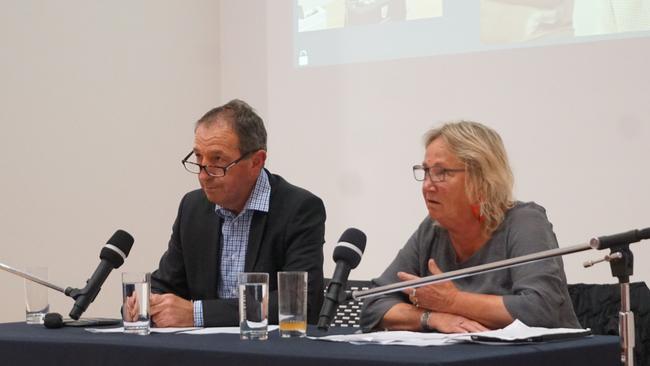‘China is not winning this trade war’ – but nor is the South East, according to industry experts
Jobs have been lost and more are at risk, yet unexpected investments have landed. Find out how Chinese-Australian trade tensions are changing our vital industries.
Mount Gambier
Don't miss out on the headlines from Mount Gambier. Followed categories will be added to My News.
Chinese-Australian political tensions may led to a $1bn investment in South East forestry but it could the mark the end for fishing families as the ongoing trade war impacts the region’s vital industries.
Forestry and fishery industry leaders joined a panel discussion facilitated by the University of South Australia to debate the local ramifications of a war expected to wage for up to seven years.
Before the boats were halted on October 28, the Chinese export market consumed 95 per cent of Southern Rock Lobster caught in south east waters.
According to Helen Strickland, chair of the South Eastern Professional Fishermen’s Association, the industry that once generated $110m in gross value of production and 1300 full time jobs in SA, was vulnerable as crayfish prices dropped by more than half.

“Not only does China take most of the fish, it takes it at the big prices,” she said.
“Its gross value production for the 2021 season will be approximately $75 million, a reduction of around 30 per cent.
“Deckhands, skippers, factory workers, truck drivers have been laid off, because there isn’t the work.”
With around 35 per cent of the quota caught prior to the lock out, Ms Strickland said the worst is likely still to come and if beach prices remained stagnant for the 2021-2022 season more job could fall.
While the price drop hurt, she said the larger issue was finding secondary markets with the pandemic impacting the industry’s ability to diversify.
“There’s been strong demand domestically in the lead up to Christmas however, it cannot absorb the amount of fish,” she said
“We’re not seeing a world that’s bounding ahead and wanting what is essentially a luxury item.”
With seven Limestone Coast ports, she predicted it could be the south zones’s family firms that were most at risk compared to the corporates of the northern zone.
“Pot prices will go down because they’re not as valuable as they were, the people who will be able to afford to pick them up are not likely to be the small players, they may be the big prize, so you may see a shift plan from family enterprises towards corporates,” she said.
Representing about 18,000 direct and indirect jobs across the state, the forestry products industry contributes about $3bn to SA’s annual economy.
The Chief Executive Officer at South Australian Forest Products Association Nathan Paine said it had been significantly less impacted than expected.
He said the suspension of log exports had led the industry to find a use for excess, lower grade fibre.
“We get the opportunity to look at a domestic manufacturing future,” Mr Paine said.
“There is potentially $1bn of new projects in Mount Gambier led by the Timberlinks CLT GLC plant and then there’s two others, pretty much ready to go.
“These are projects that might not have happened if we weren’t in the situation we’re in now.
“As well as exploring new markets in India, South Korea, Taiwan and re-engaging with Japan.”
Mr Paine said it was also working on new processes in fumigation in hopes of address China’s to bio-sanitary concerns.
Melissa Conley Tyler, Research Fellow, University of Melbourne said China was willing to use trade as a weapon but forestry and fishery export bans were hurting it’s citizens and manufactures.
“China isn’t winning this trade war,” she said.
“I think China has been very thoughtful about where it is willing to put it’s coercion, things where the cost of are born by individual Chinese citizens, or where it fits China’s other aims.
“They’ve chosen things that they feel comfortable restricting where they can beat out punishment without hurting themselves too much.”
Citing no evidence either country was willing to take steps to improve the relationship, she said industry must be louder so the economic impact on the South East was not overlooked.
“The problem between China and Australia is a political problem, it’s not an industry problem.
“No one thinks for example that the lobsters need extra hygiene tests or that the logs have pests or there are wine subsidies, it’s retaliation for a geopolitical problem and therefore, the solution has to be political.”



